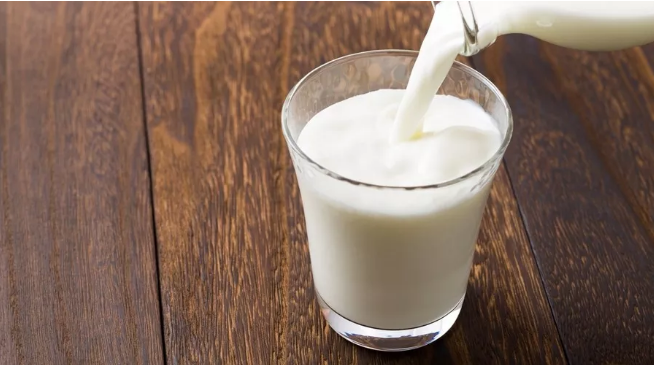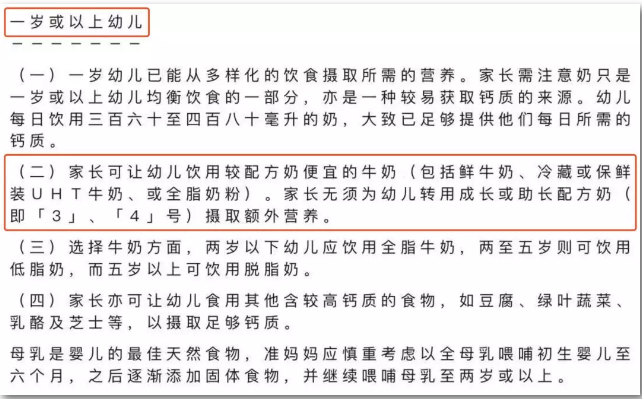Whether it is exclusively breast-fed babies or formula-fed babies, they will face a question: When the children grow up, do they need to continue drinking formula milk? Can I drink milk in what?
Take such questions to search the Internet, and most of the answers are:
Children should drink formula milk until they are 3 years old!
Milk is not easy to digest, formula milk has higher nutrition!
Today we will talk about this topic.
After the baby is one year old, he can drink milk.

Babies after the age of 1 need about 500 mL of milk every day, including formula milk, breast milk, milk and yogurt.
Formula milk is still the baby’s choice of dairy products, but it is not the only choice, let alone a must.
Unless the baby has milk protein allergy, the normal development of the baby, on the premise of ensuring a balanced diet, can drink milk after 1 year old. This is also recognized by authoritative organizations and guidelines.
The AAP of the American Academy of Pediatrics recommends:
When your baby is 1 year old, you can give him whole milk or low-fat (2%) milk to provide a balanced diet together with solid supplements (cereal, vegetables, fruits, meat).
< < Guidelines for Consensus on Healthy Beverages in Early Childhood > > also pointed out that children aged 12-24 months are recommended to drink whole milk and plain boiled water.
Some parents will say, these are all foreign, our children may not be suitable?
Let’s take a look at what the Hong Kong Department of Health said. The Hong Kong Department of Health said: Children aged one year or above can drink whole milk, such as refrigerated milk or whole milk sterilized with high temperature.

It can also be seen from this that for babies after 1 year old, the vast majority of recommended milk is no longer a single choice of formula milk.
Milk is not as nutritious as formula milk? Is it more difficult for babies to absorb?

Some unreliable parenting websites, e-commerce websites and mother and infant shops often claim that formula milk has comprehensive nutrition and poor calcium absorption in milk, which will affect digestion and stimulate intestinal tract.
Is this really the case? Let’s talk about it bit by bit.
1. Formula milk has more comprehensive nutrition?
The nutrition of children after the age of 1 mainly depends on daily diet.
The nutritional composition of formula milk is indeed more comprehensive than that of milk, but for babies after one year old, the fortified nutrients in formula milk should no longer be emphasized. At this time, milk has weakened into the role of providing part of daily protein and calcium.
As for nutrition such as fat, carbohydrate, minerals and vitamins, we suggest that babies get them from [three meals and two points].
Instead of worrying about the nutritional value of milk, formula milk is not as comprehensive as formula milk. It is better to match the baby’s three meals a day and develop good eating habits.
2. The calcium absorption of milk is not good?
The impact is limited.
Some [experts] claim that milk contains high phosphorus, which affects calcium absorption, so they should drink formula milk.
In fact, the phosphorus content in fresh milk is only slightly higher than that in formula milk, and the impact on calcium absorption is very limited.
In addition, nutrients such as potassium, magnesium and vitamin C ingested in the baby’s diet will increase calcium absorption to make up for this effect.
Therefore, it is unscientific to single out the high phosphorus content.
According to this principle, the meat the baby eats contains more phosphorus. Can’t the baby eat meat?
3. Drinking milk will affect digestion?
Lactose in milk will not affect digestion, but is beneficial to intestinal tract.
Some so-called [experts] on the Internet said that lactose in milk is not easy to digest and even causes intestinal diseases.
As a matter of fact, there is an enzyme substance in the intestinal tract of normal babies, which can decompose lactose, which is not easy to digest, into components that are easy to absorb. There is no saying that it will cause intestinal diseases.
On the contrary, lactic acid produced by lactose decomposition in the body can help the growth of probiotics in the body, inhibit the reproduction of harmful intestinal bacteria, and promote the absorption of calcium.
Does milk stimulate the intestinal tract?
After the age of 1, the digestive system of children gradually improves, and generally there will be no intestinal discomfort.
Indeed, babies under one year old have delicate intestines and stomach, imperfect digestive system development, and the protein content in milk is relatively high, which is easy to cause damage to immature intestines.
However, after the baby is 1 year old, the digestive system has been further improved. Drinking milk is generally not symptomatic of gastrointestinal discomfort for the baby at this time.
For babies after one year old, milk or formula milk can be chosen. If the child prefers formula milk and the family can afford it, they can also choose to continue to drink formula milk for the child and try to choose products that do not contain added sugar.
However, parents should be clear that [optional] does not mean [must choose].
Do you still want to choose formula milk after you are 1 year old? Think these three questions clearly first.

Some mothers will ask, I know milk is fine, and formula milk is fine. Can’t you really drink it?
Of course, this is an era of free choice, isn’t it? But to continue to give your baby formula milk, there are several issues that must be considered clearly:
1. Is the baby’s milk drinking habit good,
After the age of 1, many babies still have the habit of milk sleep and night milk, so it is almost impossible to clean their oral cavity in sleep.
The sugar content in formula milk is too high. Compared with babies who sleep with grandma cow, babies who drink formula milk are more likely to suffer from bottle caries.
For such babies, early replacement with milk can reduce the probability of dental caries.
Of course, no matter whether the baby drinks formula milk or pure milk before going to bed, he should form a good habit of brushing his teeth.
2. Does drinking milk affect children’s normal eating,
For babies after the age of 1, the focus of nutrition should have shifted to two o’clock for three meals. Milk is only an aid.
Many babies do not do a good job in the transition, and if they have resistance to eating, their mothers will take milk to gather nutrition. However, sweet formula milk will make the baby more dependent and less and less fond of eating, forming a vicious circle.
Changing milk as early as possible can weaken the baby’s expectation of formula milk and focus on three meals a day as early as possible.
3. Is the child overweight

In the traditional concept, I always think that the baby’s obesity is a sign of health, but I ignore the fact that obesity may affect development.
The sugar content in some formula milk is significantly higher than that in milk. Early feeding with milk instead of formula milk may reduce the risk of obesity of babies.
